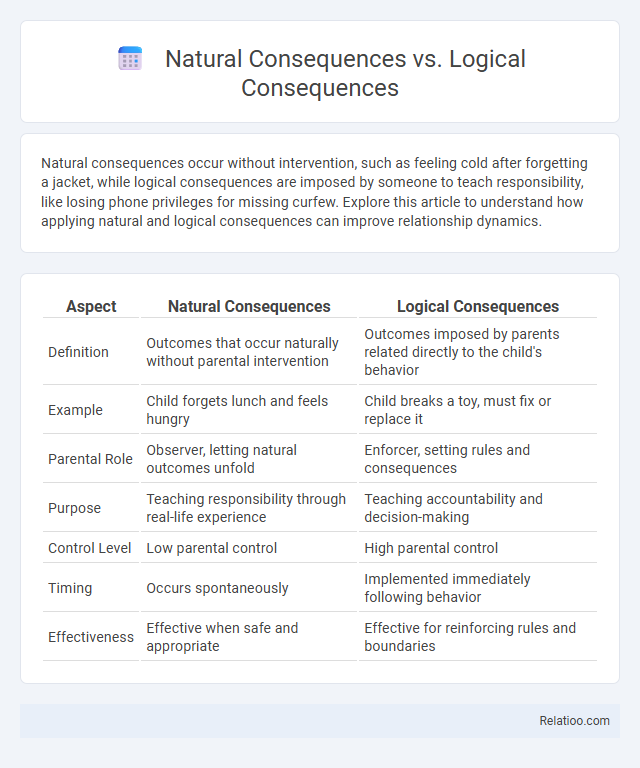Natural consequences occur without intervention, such as feeling cold after forgetting a jacket, while logical consequences are imposed by someone to teach responsibility, like losing phone privileges for missing curfew. Explore this article to understand how applying natural and logical consequences can improve relationship dynamics.
Table of Comparison
| Aspect | Natural Consequences | Logical Consequences |
|---|---|---|
| Definition | Outcomes that occur naturally without parental intervention | Outcomes imposed by parents related directly to the child's behavior |
| Example | Child forgets lunch and feels hungry | Child breaks a toy, must fix or replace it |
| Parental Role | Observer, letting natural outcomes unfold | Enforcer, setting rules and consequences |
| Purpose | Teaching responsibility through real-life experience | Teaching accountability and decision-making |
| Control Level | Low parental control | High parental control |
| Timing | Occurs spontaneously | Implemented immediately following behavior |
| Effectiveness | Effective when safe and appropriate | Effective for reinforcing rules and boundaries |
Understanding Natural Consequences
Understanding natural consequences helps you recognize outcomes that occur without intervention, promoting personal responsibility and real-world learning. Unlike logical consequences, which are structured responses tied directly to behavior, natural consequences unfold organically, allowing you to experience cause and effect authentically. Maintaining discipline consistency ensures that consequences, whether natural or logical, reinforce clear expectations and support effective behavior management.
Defining Logical Consequences
Logical consequences are outcomes directly related to a child's behavior, designed to teach responsibility and problem-solving by connecting actions with relevant results. Unlike natural consequences, which occur without adult intervention, logical consequences are intentionally imposed to encourage better decision-making while maintaining respect and fairness. Consistent discipline incorporates logical consequences to provide clear boundaries and predictable outcomes, fostering accountability and emotional growth in children.
Key Differences Between Natural and Logical Consequences
Natural consequences occur automatically as a direct result of a child's actions, such as feeling cold after refusing to wear a jacket, while logical consequences are structured responses imposed by caregivers to teach responsibility, like requiring a child to complete a missed chore. Natural consequences rely on real-world outcomes without adult intervention, whereas logical consequences are designed to be directly related, respectful, and reasonable, helping children understand the impact of their behavior. Discipline consistency strengthens effectiveness by ensuring predictable consequences that reinforce learning and promote behavioral change.
The Role of Consequences in Behavior Management
Natural consequences occur directly from a child's actions without imposed intervention, reinforcing learning through real-life outcomes. Logical consequences are structured responses related to the misbehavior, designed to teach responsibility and problem-solving while maintaining respect and clear boundaries. Consistency in discipline ensures that consequences are predictable and fair, strengthening behavior management by promoting accountability and helping children understand the link between their choices and outcomes.
Benefits of Using Natural Consequences
Natural consequences encourage children to learn responsibility through firsthand experience, fostering critical thinking and problem-solving skills without external imposition. This approach promotes intrinsic motivation by allowing children to see the direct results of their choices, leading to lasting behavioral changes. Consistently applying natural consequences supports autonomy and builds trust, strengthening the parent-child relationship while reducing reliance on punitive measures.
Advantages of Logical Consequences
Logical consequences promote responsible decision-making by directly relating the outcome to the behavior, helping You understand the cause-and-effect relationship clearly. They encourage accountability without punitive measures, fostering respect and cooperation in discipline. Consistent use of logical consequences supports long-term behavioral improvements and strengthens trust between caregivers and children.
When to Use Natural Consequences
Natural consequences occur when You allow Your child to experience the direct results of their actions, fostering real-world learning and responsibility. Use natural consequences when the outcome poses no serious harm or danger, enabling Your child to make connections between behavior and results without adult intervention. Consistent discipline balances natural and logical consequences, ensuring clear expectations and reinforcing accountability.
Situations Best Suited for Logical Consequences
Logical consequences are best suited for situations where a child's actions directly affect others or their environment, making the outcome a clear and relevant result of their behavior. This method fosters accountability by linking consequences naturally to the misbehavior, such as losing the privilege of using a toy they mishandled or needing to clean a mess they made. Consistency in discipline through logical consequences helps children understand the cause-and-effect relationship between their choices and the consequences, promoting long-term behavioral growth.
Common Mistakes in Applying Consequences
Common mistakes in applying natural, logical consequences, and discipline consistency include confusing natural and logical consequences, leading to ineffective discipline strategies. You may impose consequences that are either unrelated to the behavior or inconsistent, undermining the learning process and reducing behavioral improvement. Ensuring that consequences are directly linked to the behavior and consistently enforced promotes accountability and reinforces positive habits.
Tips for Effectively Implementing Consequences
Implementing consequences effectively requires clear communication of expectations and consistent application to build trust and understanding in behavior management. Natural consequences allow children to experience outcomes directly related to their actions, fostering intrinsic motivation, while logical consequences are designed to be related, respectful, and reasonable, helping children learn accountability. Maintaining discipline consistency across caregivers ensures predictability, which supports emotional security and reinforces positive behavioral changes.

Infographic: Natural Consequences vs Logical Consequences
 relatioo.com
relatioo.com